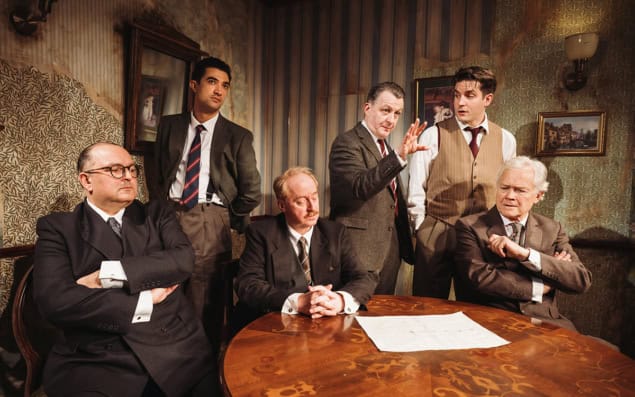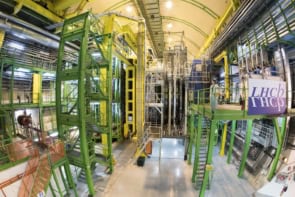Philip Ball reviews Farm Hall by Katherine Moar at the Theatre Royal Haymarket, London, which runs until 31 August 2024

As the Second World War reached its endgame in Europe in 1945, Allied forces advancing towards Berlin raced to round up German scientists who’d worked on the Nazis’ “Uranium Project” to harness nuclear fission. Code-named the Alsos mission, it picked up the likes of Max von Laue, Otto Hahn (who’d led the experiments to discover fission in 1938), Carl von Weizsäcker, and the head of the uranium work Werner Heisenberg.
The Allied military were eager to prevent those eminent scientists from falling into Russian hands. But the Americans leading Alsos had little idea of what to do with these researchers, despite the mission having Dutch physicist Samuel Goudsmit as its scientific leader. The British forces, however, offered to take them off their hands, flying the scientists to England where they were interred in a country house in Cambridgeshire called Farm Hall.
Held for six months from July 1945, the scientists were well provided for and free to talk among themselves. Unbeknownst to them, however, British intelligence had bugged the house to assess if these men could be trusted to co-operate in the post-war reconstruction of Germany. Heisenberg, as arrogant and superior as ever, dismissed the idea of any such eavesdropping. “I don’t think they know the real Gestapo methods”, he said. “They’re a bit old-fashioned in that respect.”
We know precisely what the interned scientists discussed because full transcriptions of their conversations have been available for more than three decades, first appearing in the book Operation Epsilon (IOP Publishing 1993). It’s an episode that cries out for dramatization. You have the scientists’ anxieties about what they faced next, the unfolding of bitter rivalries and blame games, and the denouement of the Hiroshima and Nagasaki bombs, news of which was met with horror and disbelief. What’s more, Farm Hall was already virtually a theatrical stage set.

No wonder, then, that the production of Farm Hall at the Theatre Royal Haymarket in London, written by playwright and historian Katherine Moar, has several precedents. The events were first dramatized by David Sington in BBC TV’s Horizon programme in 1992 and later formed the subject of a 2010 BBC radio play. There’s also been Operation Epsilon – a 2013 play by US playwright Alan Brody that ran at the Southwark Playhouse in London only last autumn.
Moar’s own play premiered last year at London’s Jermyn Street Theatre before touring and now returning to the grander Haymarket. The issues were also searchingly explored in Michael Frayn’s Copenhagen (1998), which depicts the meeting of Heisenberg with Niels Bohr in Nazi-occupied Denmark in 1941. Those issues include the culpability of the scientists in building an atomic bomb for Hitler and the wider moral tensions between science, governance and warfare.
The Farm Hall transcripts are something of a straitjacket for the dramatist, since in effect the script is already written
The Farm Hall transcripts are a remarkable resource for historians trying to deduce the real intentions and achievements of the German physicists who worked on the Uranium Project. But they are something of a straitjacket for the dramatist, since in effect the script is already written. While Moar’s own dialogue is sprightly, she is thus not really able to shed new light on the events.
Robert Oppenheimer: how cinema has depicted this icon of the nuclear age
The roles given to the German scientists do not differ much from those of previous dramatizations. Heisenberg loftily considers himself the intellectual leader and the future hope for German science. Von Laue (who did not work on uranium) is scornful of the others’ attempts to justify their support for a depraved regime. Hahn feels personally responsible for the horrors of Hiroshima.
Kurt Diebner, who led a rival uranium research team and was a Nazi party member, clashes with Heisenberg, while the younger Erich Bagge frets about having also joined the party for the sake of career advancement. Von Weizsäcker is the jovial socialite in Moar’s version, working with his hero Heisenberg to construct an extenuating story for posterity.
The key question is why the Germans, with so much expertise in nuclear science, failed to get close to making a bomb, or even a self-sustaining nuclear pile (like the one built by Enrico Fermi at Chicago in 1942). Here historians are divided. Heisenberg, as Moar acknowledges, sought to find a story that absolved the Germans of moral failure while also denying that they got the physics wrong.
At first he refused to believe the announcement of the American bomb, on the grounds that they could not possibly have succeeded where he had failed. However, he later spun a story in which the physicists had cleverly persuaded the Nazis to support the scientific work without overpromising about delivery. Later, Heisenberg even implied that he and others had deliberately falsified the maths to sabotage the bomb project.
The latter idea was popularized in the journalist Thomas Powers’ 1993 book Heisenberg’s War: the Secret History of the German Bomb, which influenced Frayn’s play but for which there is no firm documentary evidence. In fact, the US historian Mark Walker has called that version of events “tragically absurd”. To my mind, Moar also lets Heisenberg off the hook too easily.
Werner Heisenberg: controversial scientist
In a slightly arch play on the uncertainty principle – a motif that Frayn also used – she has Heisenberg deliver a final soliloquy in which he answers the question “Did you try to build a bomb?” with: “On some days yes. On others, no.” I find it more probable that the German scientists lacked the conviction that they could achieve their goal soon enough to make a difference to the war. Not having argued the case strongly, they were simply not given the resources to make much progress.
What matters more in retrospect is that so few of the scientists, including especially Heisenberg and Weizsäcker but also Hahn, took responsibility for what they had done under the Third Reich. Perhaps the only researcher who did, ironically, was Lise Meitner, who famously interpreted Hahn’s results as nuclear fission after she had fled Berlin in 1938 because of her Jewish heritage.
“You did not want to see it”, she later wrote to Hahn. “It was too inconvenient.”





